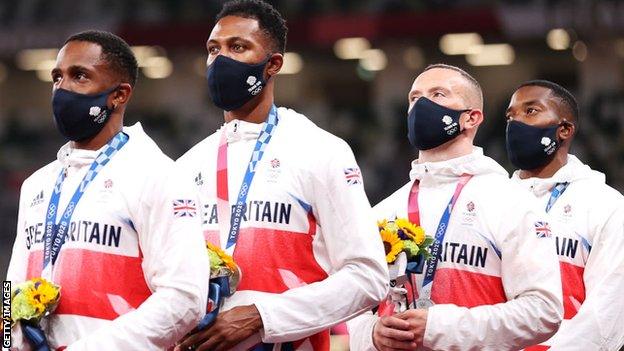CJ Ujah failed test and loss of Olympic medal 'devastating' for Team GB, says Richard Kilty
- Published

Kilty (left) formed part of the Great Britain 4 X 100m team along with Zharnel Hughes, Nethaneel Mitchell-Blake and CJ Ujah
British sprinter Richard Kilty says he will miss out on the happiness of being able to send his son to school with an Olympic medal after learning his 4x100m silver would be stripped from him.
Kilty found out on Friday that he will lose his medal because of a failed doping test by team-mate CJ Ujah.
Ujah, 27, tested positive for ostarine and S-23 but says he "unknowingly consumed a contaminated substance".
"I feel sad all round," said Kilty. "It's just a devastating situation."
The 32-year-old told BBC Radio Tees Sport: "It's absolutely heartbreaking to finally hear the news that the medal is going to be stripped and wiped from history.
"The happiness for me was to win an Olympic medal and give it to my son for him to take it into school and say 'my dad won an Olympic medal'. I never got to do that. The motivation is for the next two and a half years to make sure that job gets done properly next time."
'Only CJ knows the truth'

Ujah (left) could face a ban by World Athletics
Kilty says he is now intent on overcoming adversity by pursuing new goals and a possible gold medal in the relay at Paris 2024.
In Tokyo, he was joined by Ujah, Zharnel Hughes and Nethaneel Mitchell-Blake as the British team finished one-hundredth of a second behind Italy to claim Olympic silver.
Ujah was tested immediately after the event in August and on Friday the Court of Arbitration of Sport (Cas) concluded Team GB's quartet should lose their medal.
The news was announced along with an apology from Ujah, who blamed a contaminated supplement for the failed test and added the situation was one he "will regret for the rest of my life".
Kilty said Ujah has explained the supplement he used was not batch tested and therefore was not certified for safe use by Informed Sport, a standard British Athletics insists athletes adhere to.
"We get that hammered home by British Athletics and UK Anti-Doping," added Kilty, who is currently overcoming an Achilles injury.
"They are the rules you have to follow and I have for the last 21 years. It's just devastating that other team-mates haven't followed the rules as strictly as the rest of us. And we've been burned by that.
"I am glad CJ has apologised to us, our families and the whole set-up. I'm thankful for the apology but on the other hand the rules are rules.
"When you become a professional athlete, the main thing you sign up for is you are on a one-hour curfew for the rest of your life to provide the address and time you will be available for testing. You are responsible for everything that goes into your body - everything. You have to be accountable for that.
"It doesn't go through your mind once and it never crossed my mind ever that one of our members failed a test, not in a million years.
"Only CJ knows the truth. Either he took drugs or it was contaminated in his supplements which weren't tested. Either one is not following the rules. So it's his mistake, he's owned up to it. I'm sure he's very regretful for not following the rules as strictly as he should have done."
The punishment given by Cas has led to Britain losing an Olympic medal for just the third time at a summer or winter Games.
Judoka Kerrith Brown at the 1988 Seoul Games and skier Alain Baxter at Salt Lake in 2002 both lost bronze medals after testing positive for a banned substance.
Cas has requested World Athletics - the sport's governing body - now make their own considerations, which could include a ban from competition for Ujah.
The substances found in his samples - Ostarine and S-23 - are known as selective androgen receptor modulators (Sarms).
US Anti-Doping (Usada) says Sarms have "similar anabolic properties to anabolic steroids".

What's the worst that could happen? A delayed flight, a one-night stand and now they're neighbours...
Louis Theroux's Forbidden America: He's back and exploring the detrimental impact of the internet on American society
